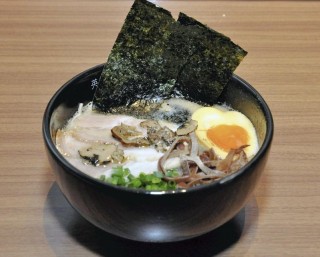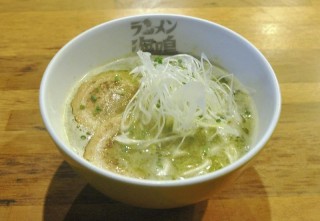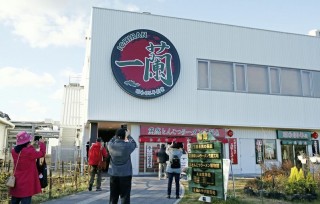Loading
Search
▼ Tonkotsu Ramen’s International Popularity Inspires Innovations
- Category:Gourmet
FUKUOKA — If you want to talk about Fukuoka Prefecture’s specialty dish, it has to be tonkotsu ramen. It is believed the ramen originated in a stall in Kurume in the prefecture, and events to celebrate the 80th anniversary of the ramen are being prepared this year. The great dish is now spreading around the world. Here are some hot topics about tonkotsu ramen.
In the Kego area in Chuo Ward in the city of Fukuoka, tonkotsu ramen shop Eikoku Shoryu opened in November last year. This shop, spelling its name in Romaji on the outer wall, has its main shop in London. It serves tonkotsu ramen created overseas and reimported to the dish’s home of Fukuoka Prefecture.
The shop has modern, smart interior decor with soft lightning. Customers can enjoy types of ramen savored by Europeans, such as one with a less intense aroma of pork stock, and another that uses truffles.
Kunizo Tokumine, 68, is the owner of the main shop, and he is a native of the city of Fukuoka. He had operated a supermarket and bookshop for Japanese in London but launched the ramen shop there in 2012, hoping that local people there would enjoy the taste of his hometown.
Tokumine did not want to force the taste used in Japan on Londoners. Instead, he created a ramen which Londoners prefer, with a lighter taste and thicker noodles. The efforts resulted in the shop becoming popular, and he now has eight shops in London. He plans to open shops throughout Britain and in other countries in Europe, but decided to open one in the prefecture first as a base to reconnect with the basics of Japanese food culture.
At the Fukuoka shop, a variety of side dishes, such as nabe hot pot and yakitori, are available.
At the Fukuoka shop, a variety of side dishes, such as nabe hot pot and yakitori, are available.
Teruyoshi Murakami, 38, who is in charge of the restaurant, said, “We’d like to suggest people enjoy dining at one place in an unhurried way like Europeans do.”
Recently, there are many tonkotsu ramen varieties that are dubbed “evolved versions,” created in exchanges with various overseas cultures. Ramen Unari’s Nakasu shop in Hakata Ward of the city serves Ramen Genoa, which is inspired by an Italian dish using basil called Genovese.
With a basil oil layer over tonkotsu soup, customers can enjoy various changes in taste, from a thick taste of tonkotsu soup to the aroma of basil, depending on how much they stir the soup. There are many who are captivated by this new taste, which is not served at other ramen shops, and more customers reportedly order the new ramen than those who order a normal tonkotsu ramen.
“The tastes sought by customers have become diversified,” said Shigeo Okubo, 39, the president of the operating company.
Ramen Jinanbo has its main shop in front of JR Hakata Station. When the shop began providing “Tairiku [continental] Ramen Asia,” a tonkotsu ramen with coconut milk and several spices added, and vegetables including red and yellow bell peppers and okra, the dish became popular.
As its predecessor was a curry restaurant, the shop utilized green curry, a popular menu item of the former restaurant. The shop said the rich taste of tonkotsu, the flavor of spices and the mildness of coconut milk are well received by customers.
Jiro Umemoto, 35, the president of the operating company And Smile, said: “We came up with this ramen simply by pursuing the pleasant taste without making a display of being unusual. When we try to find clues in styles of cooking overseas, we can further expand the possibilities of tonkotsu ramen.”
Lauded online
A bus with tourists from Taiwan stopped on a hill from which one can enjoy the pastoral view of a rural area in Itoshima, Fukuoka Prefecture.
About 30 men and women from the bus entered Ichiran no Mori, operated by tonkotsu ramen shop Ichiran in the city of Fukuoka. It is a facility which consists of a production plant, a restaurant and a retail shop, and is open seven days a week.
The facility comprises about 94,000 square meters, twice the space of Tokyo Dome. It opened in July 2014, and now attracts many tourists from overseas, especially from Asian countries.
Recently, there are many tonkotsu ramen varieties that are dubbed “evolved versions,” created in exchanges with various overseas cultures. Ramen Unari’s Nakasu shop in Hakata Ward of the city serves Ramen Genoa, which is inspired by an Italian dish using basil called Genovese.
With a basil oil layer over tonkotsu soup, customers can enjoy various changes in taste, from a thick taste of tonkotsu soup to the aroma of basil, depending on how much they stir the soup. There are many who are captivated by this new taste, which is not served at other ramen shops, and more customers reportedly order the new ramen than those who order a normal tonkotsu ramen.
“The tastes sought by customers have become diversified,” said Shigeo Okubo, 39, the president of the operating company.
Ramen Jinanbo has its main shop in front of JR Hakata Station. When the shop began providing “Tairiku [continental] Ramen Asia,” a tonkotsu ramen with coconut milk and several spices added, and vegetables including red and yellow bell peppers and okra, the dish became popular.
As its predecessor was a curry restaurant, the shop utilized green curry, a popular menu item of the former restaurant. The shop said the rich taste of tonkotsu, the flavor of spices and the mildness of coconut milk are well received by customers.
Jiro Umemoto, 35, the president of the operating company And Smile, said: “We came up with this ramen simply by pursuing the pleasant taste without making a display of being unusual. When we try to find clues in styles of cooking overseas, we can further expand the possibilities of tonkotsu ramen.”
Lauded online
A bus with tourists from Taiwan stopped on a hill from which one can enjoy the pastoral view of a rural area in Itoshima, Fukuoka Prefecture.
About 30 men and women from the bus entered Ichiran no Mori, operated by tonkotsu ramen shop Ichiran in the city of Fukuoka. It is a facility which consists of a production plant, a restaurant and a retail shop, and is open seven days a week.
The facility comprises about 94,000 square meters, twice the space of Tokyo Dome. It opened in July 2014, and now attracts many tourists from overseas, especially from Asian countries.
When people in the bus tour group ordered tonkotsu ramen, a 55-year-old man from the group took a sip of the soup, and said happily: “This is well-seasoned with salt. I like this.”
After taking a tour to watch through glass how the thin noodles are
produced at a factory, they bought instant noodles as souvenirs.
The spread of information online and by word-of-mouth is said to be one reason why tonkotsu ramen shops in the nation are crowded with many people from overseas.
A 27-year-old woman in Bangkok visited Fukuoka on business about a year ago and ate tonkotsu ramen at Ichiran. When she posted a picture on photo-sharing app Instagram, it gained such comments as “amazing” from people.
Searching the internet with keywords related to Ichiran ramen yields pictures of ramen, one after another.
“These days, word of mouth spreads around the world via the internet,” said Takeshi Saito, 51, the chief director of the Japan External Trade Organization’s Fukuoka office. “When a shop’s popularity grows at its overseas shop, there will be more ‘inbound’ [foreign tourists].”
After taking a tour to watch through glass how the thin noodles are
produced at a factory, they bought instant noodles as souvenirs.
The spread of information online and by word-of-mouth is said to be one reason why tonkotsu ramen shops in the nation are crowded with many people from overseas.
A 27-year-old woman in Bangkok visited Fukuoka on business about a year ago and ate tonkotsu ramen at Ichiran. When she posted a picture on photo-sharing app Instagram, it gained such comments as “amazing” from people.
Searching the internet with keywords related to Ichiran ramen yields pictures of ramen, one after another.
“These days, word of mouth spreads around the world via the internet,” said Takeshi Saito, 51, the chief director of the Japan External Trade Organization’s Fukuoka office. “When a shop’s popularity grows at its overseas shop, there will be more ‘inbound’ [foreign tourists].”
- May 5, 2017
- Comment (0)
- Trackback(0)





